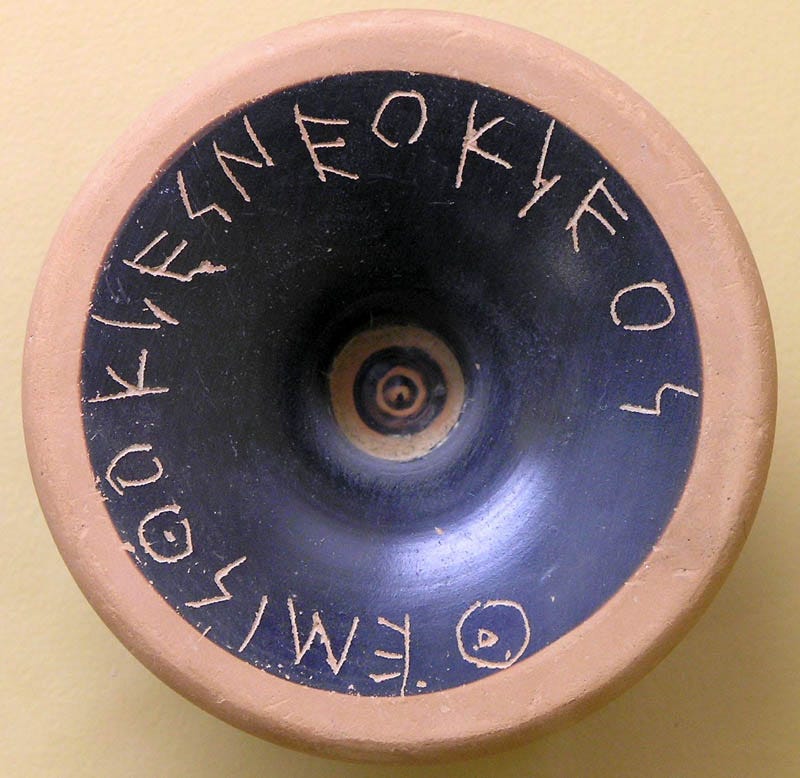Ideas in Democracy: Ostracism, Throw the Bums Out—Way, Way, Way Out
The ancient process of voting to exile a citizen didn't last long in Athens, but it fascinates us still, especially since we all know some people we wouldn't mind sending off for a decade.
This is the second piece in an open-ended series about ideas that shape democracy.

For a period of time in 5th century Athens (strictly speaking, Athens and Attica), citizens could do what many of us dream of doing today: they could exile someone. The process, known as ostracism, provided Athenians with a once-a-year opportunity to hold vote on holding an ostracophoria—a meeting of the popular assembly, the ekklesia, in which they would cast anonymous votes on who to banish from Athens for ten years. The ballots were made from pieces of broken pottery, ostraka or potsherds, on which people scratched or painted the name of a candidate to be ostracized.
If Athenians elected to hold the ostracophoria, and if a quorum of 6,000 votes was met in the subsequent vote, the person with the highest count against them would be sent away. A mere plurality of votes was enough. In their absence, the ostracized person would retain their property, collect its revenues, and keep their citizenship and status. After a decade of exile, they could return free of shame. There was no appeal of the decision and the penalty for attempting to return before ten years was death. None the less, ostracized citizens could be (and were) recalled by the ekklesia.
As John Thorley writes in Athenian Democracy, the process of ostracism was adopted by the reformer Cleisthenes, the father of Ancient Greek democracy, who “was very well aware of the potential danger of personal power” such that “he devised a method by which the state could rid itself of any individual who was wielding too much influence.” Classicist Paul Cartledge suggests, however, that while the process is attributed to Cleisthenes, no process was held until two decades after his reforms.
The institution of ostracism didn’t last long in Athens. As Cartledge notes in Democracy: A Life, it was practiced “intermittently between 488 and 416.” Moreover, it was not likely used often, though at least a dozen citizens were bounced from Athens over the course of about seven decades. In that time, as you might expect, some big names found themselves on the fuzzy end of the lollipop—or the sharp end of the potsherd, if you prefer. In 486, the well-connected and widely-known Megacles was exiled. Themistocles, the renowned general and politician, was ostracized in 471 BCE. In 461 BCE, the general Cimon was tossed.
The last recorded ostracism was in 417, wherein Hypberolos won the dubious distinction in an ostracism that we would now call a gong show (more on that below). Not long after, ostracism was replaced by a new, broader court process. While ostracism remained on the books for some time after, as Carltedge points out, the citizens of Athens never held another ostracophoria.
Keeping the peace
Whatever the origins of ostracism, classicists seem to agree that the purpose of the institution was to guard against elite domination of the polis and civic breakdown or war. In Exile, Ostracism, and Democracy, Sara Forsdyke finds ostracism emerging from past experience and internal political class struggle for power that often turned violent. She writes, “…in the archaic period (c. 750-500) elites engaged in violent competition for power and frequently expelled one another…” Later, through ostracism and other institutions, the Greeks attempted to give some order to the chaos and spare everybody some violence in the process.
Ostracism was a yearly reminder to elite Athenians not to push their luck. As Forsdyke puts it, “By reminding elites annually of the potential of non-elites to intervene decisively in violent intra-elite conflict, the institution of ostracism served as a potent symbol of the ability of non-elites to determine the outcome.” Ostracism was a democratic check, in other words, of the few by the many. As Forsdyke summarizes it, “This reminder of the historical basis of popular power would have deterred ambitious elites from trying to seize power by force in the traditional manner.”
Cartledge notes the procedure wasn’t necessarily designed to prevent tyranny per se (because it was “a clumsy and an ineffective means of achieving that goal”). Instead, “its original aim…” he writes, “was to pre-empt or to abort, stasis in the sense of outright civil war, arising from conflicts of persons and policies between would-be leaders or champions of the people.” That suggests a concern about demagogues—one we might share today. For a people nervous to maintain democratic institutions and to channel the potential violence of political life into non-violent discussion, deliberation, debate, and voting, this explanation for ostracism makes good sense. It is essentially what contemporary democracies strive to do, too, without the one-way ticket.
The last Greek to be ostracized, Hyperbolos, was a demagogue. Thorley writes that before being exiled, he had gained influence in the ekklesia and planned to use a vote on ostracism against his political opponents. Instead, his rivals, Nikias and Alcibiades, used it against him. Oops.
Hyperbolos was ostracized and subsequently murdered in Samos. The stories of the dozen or so other ostracisms read in generally similar ways: Greeks who got a bit too big for their britches and made citizens nervous had to go. The rest, meanwhile, were reminded of the consequences of flying too close to the sun.
Mob rule by potsherd?
Aristotle was weary of ostracism. Of it he writes that the process “has not been fairly applied in states; for, instead of looking to the public good, they have used ostracism for factious purposes.” This critique echoes his concern that democracy could become rule by the mob—mobocracy—and recalls to us our contemporary concern for preserving minority rights. A contemporary look at ostracism puts that concern in perspective. Imagine the process today, a gathering of each voter to decide which single person to eject from the community for a decade. It’s a bit like what happens daily on Twitter, admittedly, but with higher stakes. Either way, common sense makes it obvious how the process could be—and would be—abused, even if its intention, as Forsdyke argues, was moderation.

Were ostracism to exist today, no doubt we would get dog-piling, elite manipulation, and scapegoating. The institution strained to function in Ancient Athens; it wouldn’t stand a chance in a mass democracy, particularly in the social media age. And much like today’s “cancel culture” discourse, those most likely to be affected might not end up being the people you’d expect (or prefer). Instead of tossing demagogic politicians or right-wing authoritarian populists, we could well see left-wing reformers, social gadflies, and marginalized individuals removed for daring to shout “Fire!” as the world burns.
A story, perhaps apocryphal but often repeated, tells of the ostracism of Aristides. It’s recounted by Plutarch and typically appears whenever ostracism is mentioned. A member of the ekklesia, not knowing who he was talking to, asks Aristides to write the name “Aristides” on his ballot. The morally upright Aristides doesn’t protest or refuse. Instead, he asks the assembly member why he intends to mark that name on the ostraka, to which he replies that he’s sick of hearing Aristides called “The Just.”
True or not, the story resonates because we all know someone, or at least know of someone, who fits the bill as the ignorant member of the assembly. Our politics is often marked by some iteration of “fuck you,” as a response of anger, frustration, or partisan alliance to a political proposal or event. Knee-jerk emotional outbursts are frequent occurrences in public life. Our democratic institutions don’t encourage deep, persistent participation in public life by day to day folks, as I’ve argued before. Nor do they encourage us to explore emotional responses, which are utterly essential to life, and to leverage them to shape and share our preferences in ways that produce better outcomes. Instead, we contract the job of politics out to a professional class. But it turns out they’re subject to the same social and identarian commitments, prejudices, proclivities, and passions as everyone else. Every day, one after another enacts the story of the ostracism of Aristides “The Just.”
Ostracism isn’t coming back any time soon. In its place, across democratic jurisdictions, we have adopted institutions such as general elections, recall elections, criminal and civil court proceedings, impeachment and removal from office, votes of confidence, norms of forbearance, and further mechanisms to keep the peace and limit the power of demagogues, would-be tyrants, and the prospect of violence. Still, we all know those safeguards can and do break down all the time all around the world, in small ways and in big ways. The election of Donald Trump was a instance of that in the United States. You can, no doubt, think of your own example—and you are almost surely doing so right now.
None the less, thinking about the ancient process of democratic exile, which was practiced not only in Athens and Attica, but also in Argos, Miletos, Sicily, Syarcuse, and elsewhere, is salutary. It is a reminder that a self-governing people has the right, indeed the duty, to establish limits and to defend itself from those who would dismantle democracy through the system itself. That ancient threat is still with us today, and we ought to be as vigilant in guarding against it as they were 2,500 years ago.


We limit the accumulation of political power by individuals indirectly, via rules on elections and campaign finance. In a parliamentary system, a sufficiently widespread mutiny can cost the first minister confidence of the chamber.
Ostracism serves its function best when the political sphere is embedded in public life. Everybody wants to be seen at the agora.
As politics becomes a distinct activity from everyday life, does ostracism have the same utility?